Porcelain slab fabrication is a fascinating process that combines artistry and technical expertise to create stunning and functional surfaces. From the selection of high-quality materials to the precision cutting and shaping, every step in the fabrication process plays a crucial role in achieving the desired result. The intricate details involved in porcelain slab fabrication require skilled craftsmen who meticulously transform raw materials into exquisite finished products.
In this discussion, we will explore the various techniques and methods used in porcelain slab fabrication, uncovering the secrets behind the creation of these remarkable surfaces. So, without further ado, let's embark on a journey into the world of porcelain slab fabrication and discover the craftsmanship behind its allure.
A porcelain slab is a durable and versatile type of specialty ceramic that is commonly used in a wide range of applications. It offers many advantages, including its durability and versatility. Porcelain slabs are known for their strength and resilience, making them ideal for high-traffic areas and surfaces that require long-lasting performance. Additionally, porcelain slabs can be customized to suit various design preferences, allowing homeowners and designers to create unique and personalized spaces.

There are several popular types of porcelain slabs available in the market. These include designs that resemble natural stones like marble, as well as a variety of pattern and color options. From dark tones to bright whites, there is a wide range of choices to match any aesthetic preference. Porcelain slabs can be used for kitchen countertops, fireplaces, furniture, and much more. They are suitable for both indoor and outdoor applications, making them a versatile surface option for any area in a home.
Browse our porcelain slab catalog: catalog 1 ,catalog 2 .
Porcelain slabs are created through a meticulous manufacturing process that involves the combination of high kaolinite content clay with minerals like silica and feldspar, followed by firing in a kiln to achieve a finished product. This process results in a strong and flexible material that offers several advantages over natural stone.
The manufacturing process of porcelain slabs begins with the selection of high-quality clay that contains a high percentage of kaolinite. This clay is then mixed with minerals like silica and feldspar to enhance its strength and durability. The mixture is then shaped into slabs and fired in a kiln at high temperatures. This firing process not only hardens the clay but also activates the minerals, creating a dense and homogeneous material.
Fabrication techniques can be applied to porcelain slabs to enhance their appearance and functionality. These techniques include polishing, honing, and texturing the surface to achieve different finishes. Porcelain slabs can also be cut into various sizes and shapes to fit specific design requirements.
Porcelain slabs offer several advantages over natural stone. They are more resistant to stains, scratches, and heat, making them ideal for use in kitchens and bathrooms. Additionally, porcelain slabs are non-porous, making them hygienic and easy to clean. They also have a consistent color and pattern, unlike natural stone, which can vary.
In terms of sustainability, porcelain slabs are an eco-friendly choice. They are made from abundant natural materials and can be recycled at the end of their life cycle. Compared to other countertop materials like granite or quartz, porcelain slabs require less energy and water to manufacture, making them a more sustainable option.
When choosing a porcelain slab, there are several key factors to consider. One important factor is hygiene, as porcelain slabs are non-porous and resistant to bacteria growth. Additionally, porcelain slabs are low maintenance, requiring minimal cleaning and upkeep. They also offer UV resistance, heat resistance, and stain resistance, making them a durable and practical choice for various applications.
Hygiene
To ensure optimal hygiene in various spaces, choosing a porcelain slab is a wise and practical choice. Porcelain slabs offer several hygiene benefits in bathrooms, making them an ideal choice for surfaces in this area. Additionally, porcelain slabs are easy to clean and maintain, ensuring a clean and germ-free surface. Here are some maintenance tips for keeping porcelain slabs clean and germ-free:

Furthermore, the importance of UV resistance in porcelain slabs cannot be overlooked, especially for outdoor applications. Porcelain slabs with UV resistance will not fade or deteriorate when exposed to sunlight. Lastly, the heat resistance of porcelain slabs makes them suitable for kitchen countertops, where hot pots and pans are often placed. Porcelain slabs are resistant to heat and will not be damaged by high temperatures. With their stain resistance and easy maintenance, porcelain slabs will keep your surfaces looking pristine and hygienic.

Maintenance
With its exceptional durability and low maintenance requirements, a porcelain slab is the perfect choice for those seeking a surface that is both aesthetically pleasing and easy to care for. When it comes to maintenance, porcelain slabs require minimal effort to keep them looking their best.
Cleaning tips include using mild soap and water or a non-abrasive cleaning solution. Regular sweeping or vacuuming can help prevent dirt and debris from scratching the surface. It is recommended to follow a maintenance schedule, which may include periodic sealing and resealing to protect against stains and enhance longevity. Long-term care involves avoiding heavy impact or sharp objects that can cause damage. Overall, porcelain slabs offer a hassle-free maintenance routine, making them a practical and stylish choice for any space.
UV Resistance
Porcelain slabs not only offer exceptional durability and low maintenance, but they also provide superior UV resistance, making them an ideal choice for a variety of applications. Here are some key points to consider when it comes to the UV resistance of porcelain slabs:
Pros and Cons:
Durability and Longevity:

Design and Aesthetics:
Installation Process:
Maintenance Tips:
Heat Resistance
Porcelain slabs are renowned for their exceptional heat resistance, making them an ideal choice for a variety of applications. The durability and heat resistance of porcelain slabs make them suitable for use in fireplace surrounds, kitchen countertops, and other areas that are exposed to high temperatures.

Unlike other materials, porcelain slabs do not warp or crack when subjected to heat, ensuring their long-lasting performance. In addition to their heat resistance, porcelain slabs also offer aesthetic appeal and versatility. They come in a wide range of colors, patterns, and finishes, allowing homeowners to achieve their desired look. The installation process for porcelain slabs is straightforward, and with proper care, these slabs can maintain their beauty and functionality for years to come.
Stain Resistance
Having established the exceptional heat resistance of porcelain slabs, it is important to consider another key advantage that makes them a preferred choice for various applications: their remarkable stain resistance. Porcelain slabs offer several pros and cons when it comes to stain resistance.
On one hand, they are highly resistant to stains, making them easy to clean and maintain. On the other hand, certain substances like oil or acidic liquids can potentially cause stains if not promptly cleaned. To maintain stain resistance in porcelain slabs, it is recommended to wipe up spills immediately and regularly clean the surface with a mild detergent.
Additionally, using a sealant can provide an extra layer of protection against stains. When comparing stain resistance in different types of porcelain slabs, it is essential to consider their composition and fabrication process.
Ultimately, stain resistance should be balanced with other factors such as durability, aesthetics, and cost when choosing porcelain slabs for a project.
Value
To fully understand the value of choosing a porcelain slab, it is important to consider its unique combination of durability, versatility, and aesthetic appeal. Porcelain slabs offer numerous advantages in terms of fabrication, making them a preferred choice for many applications. Designing with porcelain slabs allows for customization and capturing specific design styles, making them ideal for large-scale projects or specific aesthetics.
Furthermore, porcelain slabs are suitable for commercial spaces due to their durability and low maintenance requirements. When it comes to installation, there are tips to ensure a successful outcome, such as using proper adhesives and following manufacturer guidelines.

Additionally, maintaining the beauty of porcelain slabs is relatively easy, as they are resistant to stains and can be cleaned with mild detergents.
Overall, the value of choosing a porcelain slab lies in its ability to provide a durable, versatile, and aesthetically pleasing surface for various applications.
So now experience the perfect combination of beauty, durability, and low maintenance with our premium porcelain slabs. Whether you’re working on a residential renovation or a large commercial project, our team of experts is here to help you choose the right slabs to match your vision. Contact us today for a free consultation, request a product catalog, or order a sample to see the superior quality of our slabs for yourself.
Customization options are available for porcelain slabs, allowing them to be tailored to specific design styles and preferences. These options provide homeowners and designers with the flexibility to create unique and personalized spaces. Here are some key points about the customization of porcelain slabs:


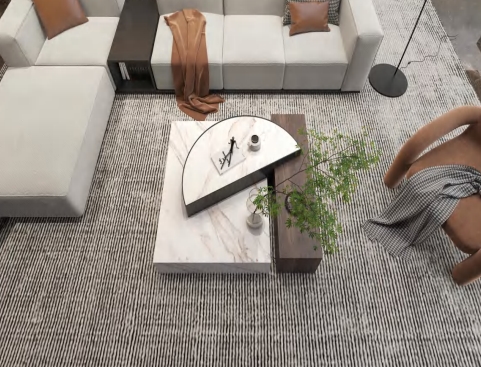
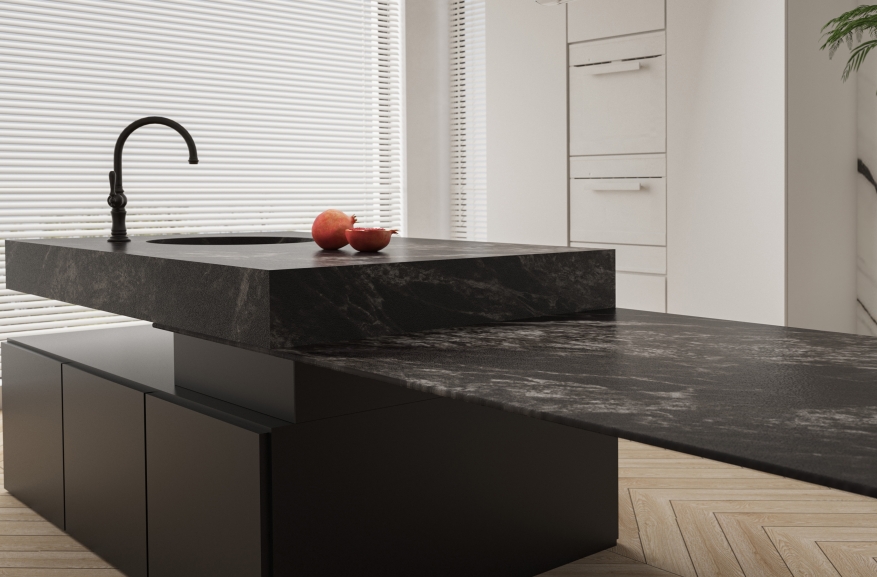

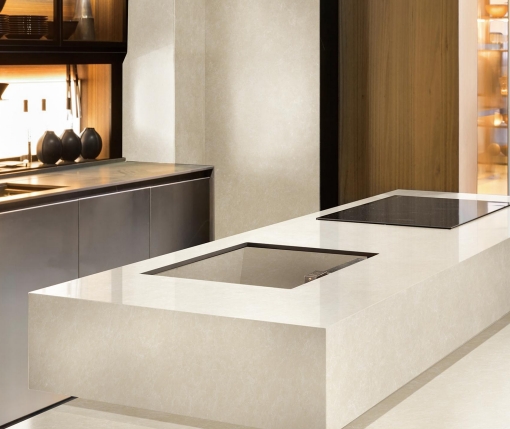
Looking to bring your unique design vision to life? At SUNVIN, we specialize in crafting custom porcelain slabs tailored to your specific needs. Contact us today to discuss your project requirements.
Porcelain slabs are a popular choice for home surfaces due to their durability and versatility. When it comes to porcelain slab trends, there are several types that are currently in high demand.
One popular option is porcelain slabs that resemble natural stones like marble. These slabs offer the beauty and elegance of natural stone, but with the added benefits of durability and easy maintenance.
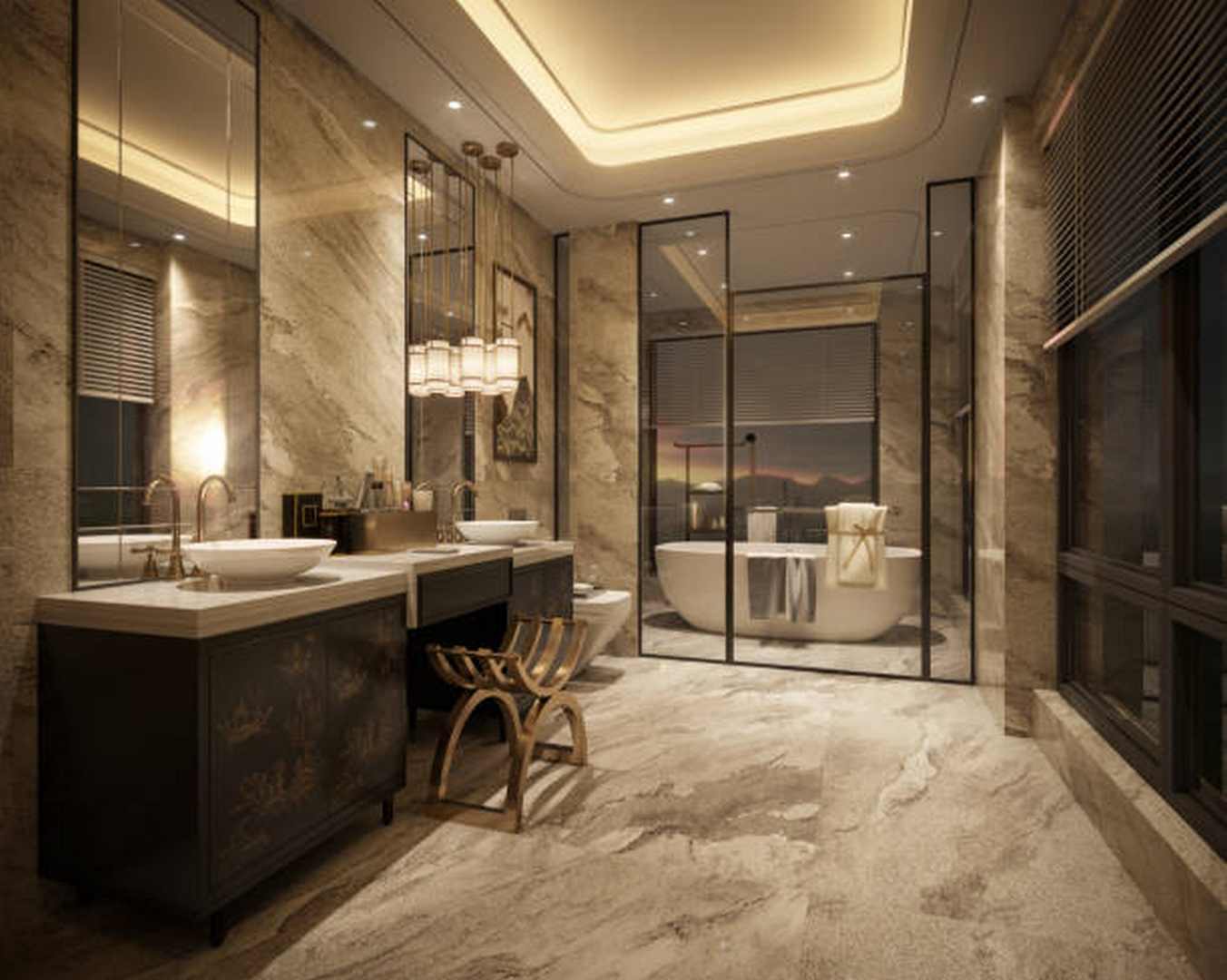
Another popular trend is the use of porcelain slabs in wood designs. These slabs mimic the look of real wood, but without the drawbacks of warping or maintenance associated with natural wood.
In terms of color options, dark tones and bright whites are particularly popular. Dark-toned porcelain slabs add a touch of sophistication and drama to any space, while bright whites create a clean and timeless aesthetic. Additionally, marbled styling options are also gaining popularity, as they offer a unique and elegant look.
Porcelain slabs can be customized to match any design style or functionality. Whether it's for a large-scale project or a specific style, experienced porcelain slab fabricators can help bring any vision to reality.
In terms of installation, it is important to follow proper porcelain slab installation techniques to ensure a long-lasting and beautiful result. Additionally, regular maintenance is key to keeping porcelain slabs looking their best. Simple tips such as regular cleaning with mild soap and water, using non-abrasive cleaning products, and avoiding harsh chemicals can help maintain the beauty of porcelain slabs.
For design inspiration, there are countless possibilities with porcelain slabs. From creating stunning kitchen countertops to adding a touch of luxury to bathroom surfaces, porcelain slabs offer endless design possibilities.
Porcelain slabs are not only popular in residential settings, but also have many benefits for commercial spaces. Their durability, easy maintenance, and versatile design options make them an ideal choice for high-traffic areas such as restaurants, hotels, and retail spaces.
Porcelain slabs are best suited for a wide range of applications in both residential and commercial settings. Their durability, versatility, customization options, and aesthetic appeal make them an ideal choice for various surfaces. Here are the key applications where porcelain slabs excel:


Porcelain slabs offer a wide array of color options, allowing homeowners and designers to achieve their desired aesthetic for various surfaces. The versatility of porcelain slab applications is enhanced by the availability of different finishes and customization options.
Porcelain slabs can be found in a range of colors, from dark tones to bright whites, offering a wide selection to suit different design preferences. Additionally, porcelain slabs can mimic the appearance of natural stone, providing the beauty of marble or granite without the high maintenance.
The customization options for porcelain slabs are extensive, allowing for the creation of unique and personalized designs. Homeowners and designers can choose from various patterns and styles, including solids and marbled options, to match the functionality and style of their space.
In addition to the wide range of color options, porcelain slabs also offer the benefits of durability, easy maintenance, and resistance to heat, stains, and water. This makes them an ideal choice for kitchen countertops, bathroom surfaces, and other areas that require hygiene and longevity.
When it comes to porcelain slab finishes, there are several options available to choose from. The most common types include polished, matte, silk, and bush-hammered finishes. Each finish offers a unique look and texture, allowing homeowners and designers to achieve their desired aesthetic for any project.
Polished
One of the available finishes for porcelain slabs is the polished finish, which enhances the surface with a glossy and reflective appearance. This finish offers several advantages and customization options for various applications.

Advantages:
Applications:
Customization options:
Maintenance tips:
Popular finishes:
With its advantages, customization options, and popular finishes, the polished finish is a popular choice for porcelain slabs, adding beauty and functionality to any space.
Matte
The next type of finish available for porcelain slabs is the matte finish, which offers a distinct aesthetic and unique benefits for various applications. Porcelain slab fabrication allows for creative customization options, and the matte finish provides a sleek and sophisticated look to any space.
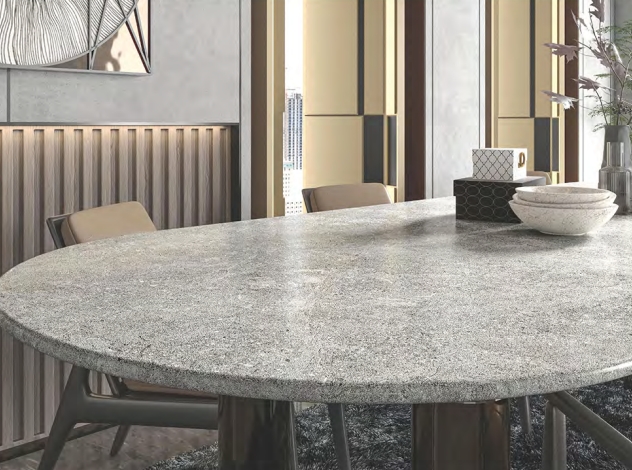
One of the advantages of the matte finish is its ability to hide fingerprints, smudges, and water spots, making it ideal for high-traffic areas or spaces where cleanliness is a priority. Additionally, the matte finish is less reflective than other finishes, making it a popular choice for outdoor applications of porcelain slabs, such as patio floors or poolside surfaces.
To maintain the matte finish, it is important to avoid using abrasive cleaners and instead opt for gentle cleaning solutions and non-abrasive tools to preserve the surface's appearance and integrity.
Silk
The silk finish is a popular option among the various types of finishes available for porcelain slabs. It offers a unique and elegant look that appeals to many homeowners and designers. When it comes to silk fabrication, there are a few key points to consider:

Bush-Hammered
Bush-Hammered is one of the available finishes for porcelain slabs, offering a unique texture and aesthetic appeal to any surface. This finish is achieved through a mechanical process that involves repeatedly striking the surface with a specialized hammer and creating a rough, textured pattern. The advantages of a bush-hammered finish include enhanced slip resistance, making it suitable for outdoor spaces such as patios and pool decks. It also adds a distinct tactile experience and visual interest to the surface. Maintenance tips for a bush-hammered finish include regular cleaning with mild soap and water, avoiding harsh chemicals or abrasive cleaners that may damage the surface. When compared to other finishes, bush-hammered porcelain slabs stand out for their durability and ability to withstand heavy foot traffic. Design inspiration for this finish can be found in modern or industrial-style spaces, where the rough texture adds a unique touch to the overall aesthetic.
Browse our porcelain slab catalog: catalog 1 ,catalog 2 to explore more color and finish options!
Porcelain slabs offer a cost-effective solution for homeowners seeking beautiful and durable surfaces. Here are the key points to consider when evaluating the affordability of porcelain slabs:
Pros and Cons:
Durability vs. Cost:
Comparing with Natural Stone:
Installation Process:
Longevity and Warranty:
At SUNVIN,we are a professional porcelain slab manufacturer and supplier in China, specializing in wholesale. Our prices are competitively lower than others, offering high-quality products that deliver the best value for your investment. Contact us today to explore our wide range of premium porcelain slabs and get the best deal for your business!
After considering the affordability and durability of porcelain slabs, it is important to explore their suitability for outdoor use. Porcelain slabs have gained popularity as a versatile and durable material for various applications. When it comes to outdoor applications, porcelain slabs offer several advantages.
One of the main advantages of using porcelain slabs outside is their durability and longevity. Porcelain slabs are resistant to extreme weather conditions, including UV rays, freeze-thaw cycles, and moisture. This makes them an ideal choice for outdoor areas such as patios, walkways, and pool decks.

The installation process for outdoor porcelain slabs is similar to that of indoor applications. However, there are a few additional considerations to keep in mind. Proper base preparation and the use of suitable adhesives and grouts are essential for a successful installation. It is also important to ensure proper drainage to prevent water accumulation and potential damage to the slabs.
Maintenance tips for outdoor porcelain slabs include regular cleaning to remove dirt and debris, as well as sealing the slabs to enhance their resistance to stains and fading. It is also recommended to avoid using abrasive cleaners or tools that could scratch the surface of the slabs.
Porcelain is an exceptionally practical choice for kitchens due to its durability, versatility, and low-maintenance qualities. Here are some reasons why porcelain slab is a practical option for kitchen surfaces:
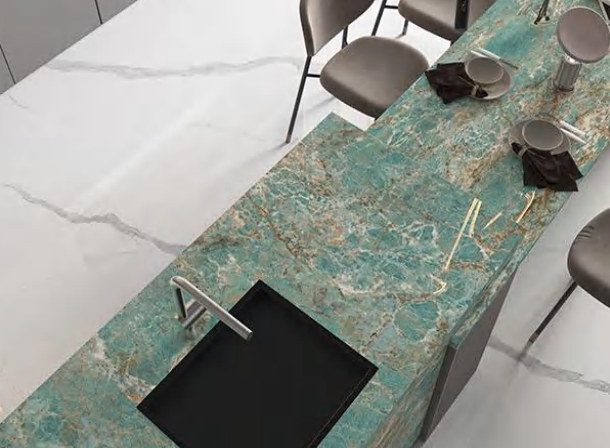
The cost of porcelain slab varies depending on various factors such as the brand, thickness level, and finish choice. When considering the cost of porcelain slabs, it is important to take into account the quality and durability of the material, as well as its aesthetic appeal. Factors affecting porcelain slab pricing include the brand reputation, the level of craftsmanship involved in the fabrication process, and the complexity of the design.
When comparing the cost of porcelain slabs to natural stone, porcelain slabs are often more budget-friendly. Natural stone can be expensive due to the rarity of certain materials and the difficulty in extracting and processing them. Porcelain slabs offer a more affordable alternative that still provides the luxurious look of natural stone.
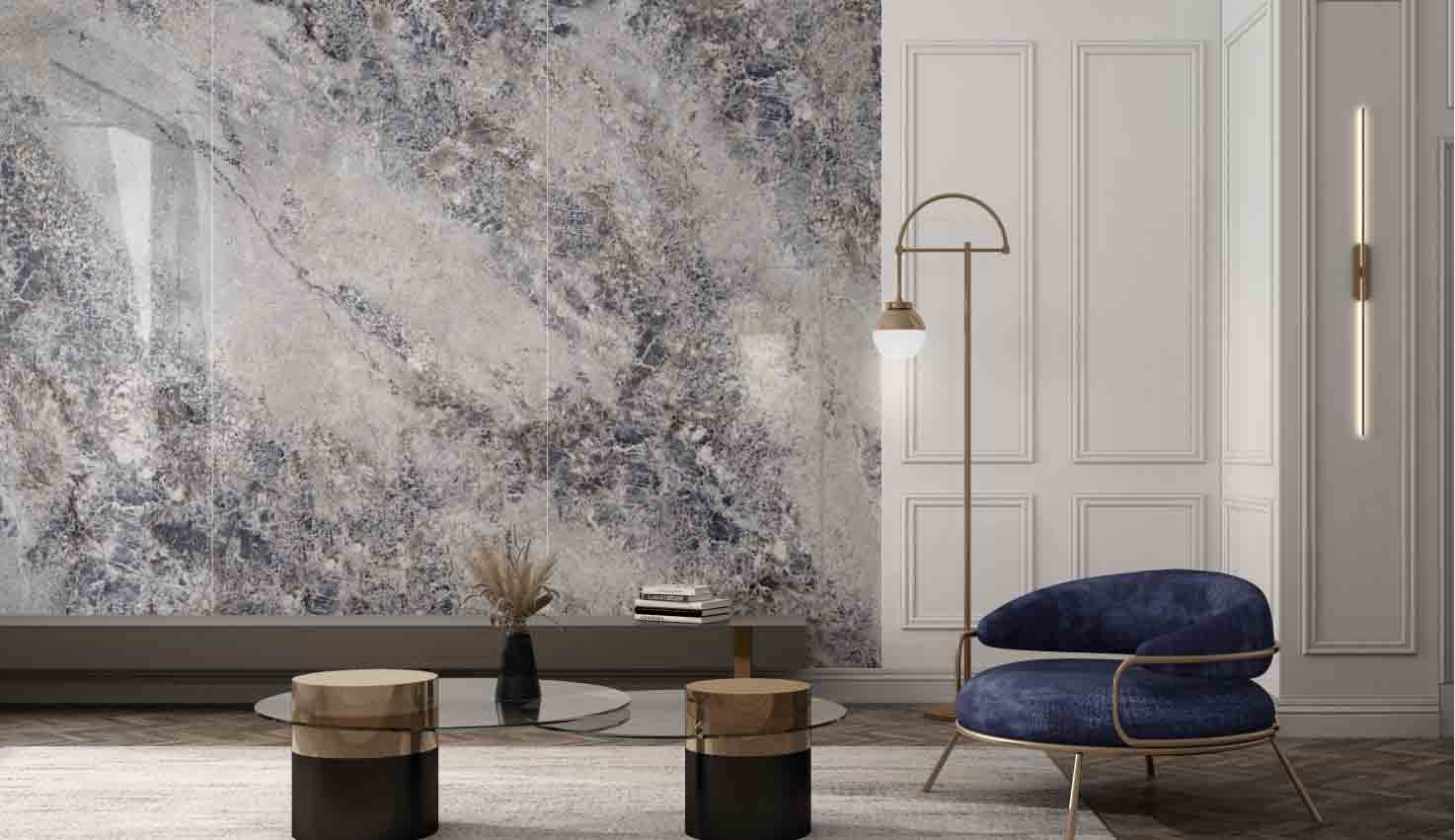
For those on a tighter budget, there are budget-friendly porcelain slab options available. These may include slabs with simpler designs or a lower level of customization. Additionally, there are cost-saving tips for porcelain slab projects, such as choosing a standard thickness level and opting for a simpler finish.
Investing in high-quality porcelain slabs is often worth the price, as they offer excellent durability, resistance to stains and scratches, and a long lifespan. High-quality porcelain slabs also provide a beautiful and luxurious aesthetic that can enhance the value and appeal of any space.
To effectively maintain the pristine condition of a porcelain slab surface, it is essential to follow a proper cleaning regimen using recommended products and techniques. Here are some cleaning methods, best cleaning products, and tips and tricks for cleaning a porcelain slab surface:
Cleaning methods:
Best cleaning products:
Preventing stains:
Removing tough stains:
Cleaning tips and tricks:

In conclusion, porcelain slabs offer a durable and versatile option for various spaces. Their manufacturing process involves combining clay with minerals and firing them in a kiln, resulting in a strong and flexible material. The customization options allow for capturing specific design styles, making them suitable for large-scale projects or specific preferences. Porcelain slabs are popular for their resemblance to natural stones like marble and their ease of cleaning and maintenance. Overall, they provide a practical and aesthetically pleasing choice for kitchens, bathrooms, and other surfaces.
Now discover the full range of Sunvin Ceramics large porcelain slabs for floor and walls, backsplash and kitchen countertop and much more. Sunvin Ceramics large format porcelain slabs are available in different sizes, effects and finishes. These large porcelain slabs are perfect for every residential and commercial application.